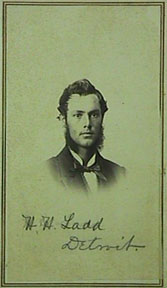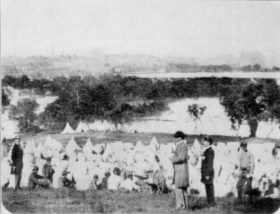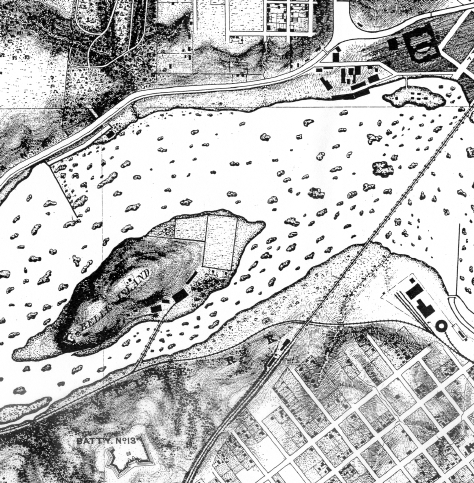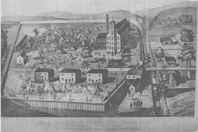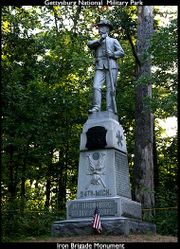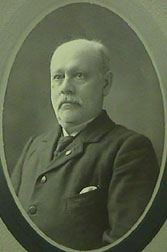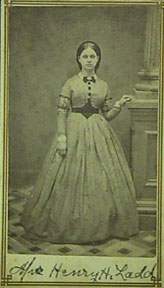Diary of Henry H. Ladd
Prisoner of War at Belle Isle, VA and Salisbury, NC
|
Henry Harrison Ladd enlisted in company D, 24th Michigan on August 7, 1862. He mustered into service on August 13, 1862. at Dearborn, MI. He was wounded in action at Gettysburg, PA, perhaps not seriously. He was assigned to hospital duty until April 1864. After returning to the Regiment, Henry was appointed a mounted orderly for General Wadsworth until the latter was critically wounded at the Wilderness on May 6, 1864. He also served as an orderly for the division Surgeon-in-Chief Chamberlain and General Cutler until August 1864. He was captured at the battle for the Weldon Railroad, August 19, 1864. For a time he was held at Belle Isle in Richmond Virginia. He was later moved to the camp at Salisbury, North Carolina, where he was held for 5 months. He was finally paroled in February, 1865. He mustered out in Detroit, on June 16th, 1865. He married Annie Edwards on 18 Aug 1862. They had four children. Henry Ladd is known to have attended the Dedication of the 24th Michigan's Monument at "Michigan Day at Gettysburg", June 12th-14th, 1889. He died September 19, 1910 in Dearborn, Wayne Co, MI. |
PedigreeDaniel Ladd Nathaniel Ladd Nathaniel Ladd Elias Ladd Dr John Ladd Josiah Ladd Loram Ladd |
| Friday. August 19, 1864 | I am a prisoner; marched to Petersburg and lodged in gaol. | |
| Saturday August 20, 1864 | Start for Richmond. Escorted to a tobacco warehouse near Libby Prison. | |
| Sunday, August 21, 1864 | Feel rather rough after sleeping on the hard floor with wet clothes on. Move into Libby Prison. All are searched for the third time. Marched to Belle Isle. |
Belle Isle Confederate Prison Belle Isle is located west of Richmond, Virginia in the James River. During the Civil War, this small and beautiful island was used as a Civil War Prison. Holding only a few small shacks, the island afforded no protection from the elements to the Union soldiers who were captured and taken there. Prisoners were given tents to sleep in but the tents numbered 3000, while the soldiers held there, numbered almost 10,000 by 1863. A hospital for prisoners and an iron factory were located on the island, but no barracks were ever built for the prisoners, hence the continuous exposure to weather played a large role in the death toll on Belle Isle. "Stormy and disagreeable weather. From fifteen to twenty and twenty-five die every day and are buried just outside the prison with no coffins- nothing but canvas wrapped around them." So wrote captured Union soldier John Ransom in his November 27, 1863, diary entry from Belle Island Prison. On February 11, 1864, the 20-year-old brigade quartermaster wrote that there was "a good deal of fighting going on among the men;" they were "just like so many hungry wolves penned together." Bands of predatory prisoners roamed the encampment, robbing their fellow prisoners of rations, blankets, and anything else they wanted. The commandant admitted that he could do nothing to stop the gangsters, as he had only enough men to try to prevent escapes. Beautiful Belle Isle, in the James River at Richmond, became a Confederate prison after 1st Bull Run, confining Union noncommissioned officers and enlisted men. No barracks were erected; Belle Isle and the Union prison at Point Lookout, MD, were the only major Civil War prisons that were made up of clusters of tents. Although Belle Isle Prison was intended to hold only 3,000 men, with tents provided to house that many, its population swelled to double that number and more. The island's location in the rapids of the James River made escape very perilous. Many of the men who tried it drowned before reaching safety.
|
| Monday, August 22, 1864 | Slept on the ground without a rag under or over me. No tents on the island. Had one meal to-day, half a cup of bean soup and corn bead. Rained all the afternoon and night. No tents nor blankets. | |
| Tuesday, August 23, 1864 |
A cool morning. Spend my time reading my testament. Had two meals. Lay on ground. |
|
| Wednesday, August 24, 1864 | A hot day. Don't feel well. | |
| Thursday, August 25, 1864 | Up and ready for my corn dodger. Wish I was home to have a good meal. There are 4,500 prisoners on about two and one-half acres here. Bought a loaf of bread for $1.50. | |
| Friday, August 26, 1864 | Lay on the wet ground. Paid twelve shillings for a piece of bread for breakfast. Got no rations till night. Shall attend prayer-meeting to-night. | |
| Saturday, August 27, 1864 | Rained last night. No breakfast. One of our boys was shot last night by the guard. Bought two loaves of bread for two dollars. | |
| Sunday, August 28, 1864 | Dreamed of home last night. How I wish that it was so. I would attend church in old Dearborn. Had a cup of bean soup and one-quarter pound corn dodger to-day. | |
| Monday, August 29, 1864 | Rained last night. Cool this morning. Have all been counted. Two thousand more prisoners arrived to-day. | |
| Tuesday, August 30, 1864 | Had a cup of coffee made from grounds. Buy three small biscuits for a dollar. Wish I could hear from home. | |
| Wednesday, August 31, 1864 | Cold last night. Bought three loaves of bread for two dollars. | |
| Thursday, September 1, 1864 | Our Government refuses to parole us. The men think it hard. | |
| Saturday September 3, 1864 | Did not sleep half an hour all night. | |
| Sunday, September 4, 1864 | Rained last night. All were counted today. No grub. Paid fifty cents for some bread. Have spent my last shilling. Sold my wallet for three loaves of bread. Had prayer meeting tonight. | |
| Monday, September 5, 1864 | Heard good news by the rebel papers that Atlanta is ours. Have a loaf left for breakfast. Rained in the night. | |
| Tuesday, September 6, 1864 | All counted again. Sold my canteen for two loaves of bread. Rained again at night. | |
| Wednesday, September 7, 1864 | No grub. If I were on the Island of Juan Fernandez, I could have something to eat, but alas, Belle Isle is barren. | |
| Thursday, September 8, 1864 | Nearly froze last night. Am hungry but nothing to eat. | |
| Friday, September 9, 1864 | Sold my knife for six loaves of bread. | |
| Saturday, September 10, 1864 | The day closes with a row and calls for tents. | |
| Sunday, September 11, 1864 | Got half a loaf for this day's ration. Have an old bag for a bed. | |
| Monday, September 12, 1864 | Did not sleep any last night on account of cold. Nothing to eat. Not well enough to go to prayer meeting. | |
| Tuesday, September 13, 1864 | Sold my haversack for two loaves and ate them for breakfast. Had a good prayer meeting with large attendance. | |
| Wednesday, September 14, 1864 | Dreamed of home. Hear heavy cannonading. All called out. | |
| Thursday, September 15, 1864 | Sick with fever. Sold my ring for a loaf of bread. | |
| Friday, September 16, 1864 | Fever all night. Wrote home. | |
| Saturday, September 17, 1864 | Ration of bread for breakfast. | |
| Sunday, September 18, 1864 | Headache and fever all night. | |
| Thursday, September 22, 1864 | Rained through the night. Have a bad cold. | |
| Friday, September 23, 1864 | A wet day. | |
| Saturday, September 24, 1864 | Have a tip-top appetite but nothing to eat. | |
| Sunday, September 25, 1864 | How hard to be a prisoner. Wish I was home to dinner. | |
| Monday, September 26, 1864 | Slept cold last night. Out to be counted to-day. | |
| Tuesday, September 27, 1864 | Nothing to eat till noon. Hear of Early's defeat in the Valley. | |
| Thursday, September 29, 1864 | Two of our boys retaken who attempted to escape. Did not get any grub until 3 o'clock; nearly famished. | |
| Friday, September 30, 1864 | Over 650 prisoners came from Libby. | |
| Saturday, October 1, 1864 | Nothing to eat till noon. Very hungry and cold. Rained all day. | |
| Sunday, October 2, 1864 | Slept hard last night; head aches. Am getting thin and poor. Another man shot by the guard last night. | |
| Monday, October 3, 1864 | Some tents came today. | |
| Tuesday, October 4, 1864 | This is a hard life to live and starve, but hope for better days. 1,000 men went south to North Carolina today from Belle Island. | |
| Wednesday, October 5, 1864 | About 950 men left for Southern prisons to-day. | |
| Thursday, October 6, 1864 | Left Belle Island to-day and reached Danville at 5 p.m. Sixty men in one cattle car. Such a crowd and such a time! Sell my ink bottle for bread. Good-bye Belle Isle, may I never see it again. Have ate all of my bread. Still hungry. | |
| Friday, October 7, 1864 | No rations. Sell my eye-glass for two apples. |
Salisbury Confederate Prison
The only Confederate Prison that was located in North Carolina was in the town of Salisbury. The prison was established on November 2, 1861. The site consisted of sixteen acres within and contiguous to the town of Salisbury, and contained a principal 3 story cotton factory building, about ninety by fifty feet constructed of red brick; also six brick tenements with four rooms each, and a larger superintendent's house of framed materials, with smith shop and two or three inferior buildings. A lack of water at Salisbury brought conditions of filth and unbearable stench. The daily ration there for both prisoner and guard was soup and twenty ounces of bread without meat or sorghum. Many internees lacked clothing or shelter and "muggers" among the prisoners robbed their comrades. The disease rate soared. From October 1864 to February 1865, 3,479 prisoners died out of the 10,321 confined there, or over one third of the total. The real misery for the prisoners at the Salisbury Confederate Prison began in the fall of 1864. The Prison compound designed for 2,500 men was forced to handle four times that many. Due to the Union Naval blockade there was a shortage of medicine and medical supplies which resulted in terrible suffering of the prisoners and needless deaths. Throughout the South there was a shortage of food and the Prison was no exception. Eventually, all the buildings were taken over for hospital use, and the men were forced to seek shelter that cold, wet winter under the buildings, in overcrowded tents, and in burrows dug into the hard red soil. Due to the large number of men dying daily after October 1864 a mass burial system was initiated. The bodies were collected daily and taken to the “dead house” to be counted and loaded onto a one-horse wagon. At 2:00 PM each day this wagon of the dead would be taken about ¼ mile to an abandoned cornfield where the men were buried. Eighteen trenches of approximately 240 feet each were eventually needed. |
| Saturday, October 8, 1864 | Slept in an open field. Arrived at Salisbury, North Carolina. No rations. Staid all night in an open field. Have not slept for four nights. | |
| Sunday, October 9, 1864 | We are in an enclosure of twelve acres. Got two meals to-day. Am shivering with cold. | |
| Monday, October 10, 1864 | Got half a loaf of bread for to-day's ration. Am getting very thin in body. | |
| Tuesday, October 11, 1864 | Two men died last night of exposure. | |
| Wednesday, October 12, 1864 | Wish I could hear from home or get a letter to my friends. | |
| Thursday, October 13, 1864 | Got some soup and 5 hard tack to-day. Flour is $225 a barrel, Confederate money. Pies and cakes three dollars each. | |
| Friday, October 14, 1864 | Had a cup of crust coffee and half a cake for breakfast. Hope God in his Providence will deliver us from here. Half a dozen die daily from starvation. | |
| Saturday, October 15, 1864 | Drew some bread and molasses to eat to-day. | |
| Sunday, October 16, 1864 | Wish that I was home to go to church in Dearborn. Home, sweet home - will I ever see you again? Shall keep up the good cheer and trust in Providence. One of our officers was shot to-day while hanging his clothes on a tree. | |
| Monday, October 17, 1864 | Sold some buttons and bought half a corn dodger. | |
| Tuesday, October 18, 1864 | How hard to be here starving and suffering cold when one has a home with plenty. Could I only have the crumbs of my table I would not complain. | |
| Wednesday, October 19, 1864 | The officers leave to-day for another prison. | |
| Thursday, October 20, 1864 | No news yet from home. Eighty a week are dying here. Boys digging and making earth shanties. The hospital is overflowing. Diarrhea and black fever prevail, caused by starvation. | |
| Friday, October 21, 1864 | Grub came at 9 a.m. Have a severe headache | |
| Saturday, October 22, 1864 | No tents or barracks and many must perish. Think of my dear old home daily. | |
| Sunday, October 23, 1864 | Up and ready for my half loaf. It can't be colder in Michigan. | |
| Monday, October 24, 1864 | Got a cup of flour and molasses to eat to-day. Got one tent for 100 men to-day. | |
| Tuesday, October 25, 1864 | Sold my hat band for a loaf of bread. Two loads of dead went out. They bury our men without coffins or straw. | |
| Wednesday, October 26, 1864 | Noon and no rations. Discouraged. Ten died last night. Oh, will our government leave us here to perish. | |
| Thursday, October 27, 1864 | Cloudy and rainy, How our men suffer. Will get no provisions till to-morrow. Will not the Almighty punish men for such treatment of prisoners? | |
| Friday, October 28, 1864 | Twenty-two died last night. No rations to-day. Starvation stares us all in the face. | |
| Saturday, October 29, 1864 | No food for 36 hours. Will get no bread to-day. Almost famished. The men are about to raise a mob and break out. Twelve died this morning and others dying every hour. | |
| Sunday, October 30, 1864 | Sixty hours and only one quart of rice and two small pieces of meat to eat. Twenty died this morning. Hear we are to be paroled. God grant it. | |
| Monday, October 31, 1864 | Got half a loaf of bread to-day. Eighteen dead hauled out to-day. | |
| Tuesday, November 1, 1864 | Sold my hat for a loaf of bread and $500 Confederate money. | |
| Wednesday, November 2, 1864 | No rations till dark and then drew flour. Rains and cannot cook it . | |
| Thursday, November 3, 1864 | Cloudy and awful cold. Thirty died last night. Drew half a pint of flour today. | |
| Saturday, November 5, 1864 | A few of our men are enlisting in the Confederate army hoping to escape death here. The men are forced to it by starvation. Language nor pen can describe the suffering we undergo. Men die every hour. | |
| Sunday, November 6, 1864 | Drew meal and tripe for rations. | |
| Monday, November 7, 1864 | How I wish I was back to my old Wayne County home. God has kept me thus far, and I will rely on his mercy. Six hundred came from Richmond last night. | |
| Tuesday, November 8, 1864 | No rations to-day. | |
| Wednesday, November 9, 1864 | Trade pantaloons and get half a loaf of bread to boot. Traded boots and gave half a loaf of bread worth five dollars. | |
| Thursday, November 10, 1864 | Rainy. Slept only half the night. | |
| Friday, November 11, 1864 | Saw a piece in the Raleigh Standard that the Governor of Georgia favors peace | |
| Sunday, November 13, 1864 | What a cheerless sabbath; about eighteen die daily. | |
| Monday, November 14, 1864 | Hear that Lincoln is elected. Bourassas of Company F, Twenty-fourth Michigan is dead. | |
| Wednesday, November 16, 1864 | Half a loaf of corn bread for this day. | |
| Thursday, November 17, 1864 | Hear that letters will go North. Must write to my friends. | |
| Friday, November 18, 1864 | Corn bread for ration. | |
| Saturday, November 19, 1864 | Lay abed all day to keep warm. Cold and Stormy. Got half a loaf of poor corn bread. Men are dying like sheep with the rot. |
24th Michigan Monument
|
| Sunday, November 20, 1864 | It still rains. Cold and muddy. In bed to keep warm. Got half a loaf of sour corn bread. | |
| Monday, November 21, 1864 | Rained all night and all day. Mud knee deep | |
| Tuesday, November 22, 1864 | Awful cold day, one freezes to stir out long enough to draw rations. Willaird of Company A, Twenty-Fourth Michigan died last night. | |
| Wednesday, November 23, 1864 | Too cold to take off our clothes to skirmish for "greybacks." | |
| Thursday, November 24, 1864 | Thanksgiving day at home. We get only a quarter loaf of bread. Hardly enough to live on. Forty die daily. | |
| Friday, November 25, 1864 | I write with sad heart. Only got four ounces of bread today. Suffering with cold. Nearly naked. Covered with lice. Oh, what a fate! Must we die? Will not God deliver us from this hell? | |
| Saturday, November 26, 1864 | Yesterday the mob secured the guard and rallied to get out. We lost in killed and wounded about ninety. | |
| Sunday, November 27, 1864 | Drew half a loaf. One hundred colored soldiers came in to-day. | |
| Monday, November 28, 1864 | Got two ounces of meat. There is plenty of bread in the cook house but C.S.A. would rather have us starve fifty a day | |
| Wednesday, November 30, 1864 | Saw a man drop dead from starvation. | |
| Monday, December 5, 1864 | No hope of parole. Half a loaf and a potato for to-day's ration. | |
| Thursday, December 8, 1864 | Chapman, of Company K, Twenty-fourth Michigan died this morning, | |
| Saturday, December 10, 1864 | Seventy-five men have died since yesterday. | |
| Sunday, December 11, 1864 | Men still dying over fifty a day. Hear that Sherman is twenty-five miles of Savannah. Hope something will turn up. | |
| Tuesday, December 13, 1864 | Slept none last night it was so cold. | |
| Thursday, December 15, 1864 | On quarter rations. Hear that we are to go to South Carolina. Hope that we will get out of this accursed place. Shall I ever see home again? | |
| Saturday, December 17, 1864 | Bought an onion for a dollar. | |
| Sunday, December 18, 1864 | Had a cup of good soup made from a bone. | |
| Tuesday, December 20, 1864 | In bed all day. Rain at night run in on our bed. | |
| Wednesday, December 21, 1864 | Cold and muddy. Still stick to our beds to keep from freezing. Got only half a loaf of bread to-day. Disease and death doing their work as usual. | |
| Thursday, December 22, 1864 | Drew bread and molasses. | |
| Friday, December 23, 1864 | Nearly frozen. No fire. Only a piece of raw corn bread to eat. How long must we suffer so? | |
| Sunday, December 25, 1864 | Had a loaf of bread and rice soup for Christmas dinner. | |
| Monday, December 26, 1864 | The Catholic prisoners about 200 left for a new camp. | |
| Wednesday, December 28, 1864 | Clark W. Butler of Company H, Twenty-fourth Michigan died to-day. | |
| Friday, December 30, 1864 | Half a loaf only. Getting discouraged. Men still dying like sheep. No relief. Our government has forsaken us! God forgive but we never can. | |
| Sunday, January 1, 1865 | Sergeant Nardin of Company I, Twenty-fourth Michigan, died last night | |
| Monday, January 2, 1865 | Living in bed to keep warm. Oh, how dreary is such a life. Will we ever get out of this place? | |
| Tuesday, January 3, 1865 | Drew salt meat and bread. | |
| Wednesday, January 4, 1865 | The men still sicken and die. | |
| Thursday, January 5, 1865 | In bed to keep warm. Will it ever be my lot to see home again? | |
| Friday, January 6, 1865 | Rainy and mud knee deep. |
Henry was 67 years old
|
| Sunday, January 8, 1865 | Too cold to look over my clothing for lice. Got half a loaf. Burnett of Company H, Twenty-fourth Michigan is dead. | |
| Monday, January 9, 1865 | Sitting in bed all shivering with the cold. | |
| Tuesday, January 10, 1865 | Rained all night. mud too deep to stir outside. John A Sherwood of Company C, Twenty-Fourth Michigan has also died here. | |
| Wednesday, January 11, 1865 | Only some molasses to eat today. | |
| Thursday, January 12, 1865 | Got half a loaf. | |
| Friday, January 13, 1865 | Hunted lice on my shirt all day. Oh what a life! | |
| Saturday, January 14, 1865 | No rations in camp; 100 of us go out to work on R.R. Got half a loaf for our day's work. | |
| Friday, January 20, 1865 | Been in bed six days to keep warm. | |
| Sunday January 22, 1865 | Sick in bed. | |
| Monday, January 23, 1865 | Men dying like sheep every hour. Oh, what a horrid place! Such a stench and lice. One can hardly live. | |
| Tuesday, January 24, 1865 | Still in bed to keep warm. |
Annie Edwards
|
| Wednesday, January 25, 1865 | Hundreds are sick and dying goes on all the time. | |
| Thursday, January 26, 1865 | Nearly frozen to death. No fire, no clothing, nor anything to keep warm. One can lie down and die of despair. Hope is all that is left | |
| Friday, January 27, 1865 | Still awful cold. One of the boys by my side died last night. | |
| Saturday, January 28, 1865 | Still in bed shivering from cold. It breaks the stoutest heart. | |
| Sunday, January, 29, 1865 | Still suffer and sick. | |
| Monday, January 30, 1865 | Get less to eat every day. Am poor; will not weigh ninety pounds. | |
| Tuesday, January 31, 1865 | Things look dreary, but hope to see home again. | |
| Wednesday, February 1, 1865 | Sold my last article, my housewife, for two onions. | |
| Sunday, February 5, 1865 | Bread and molasses for rations today. Men dying as usual. | |
| Tuesday, February 7, 1865 | My diary is kept only weekly now for want of space. Snow and sleet. Lie abed all day. Could not sleep for hunger last night. | |
| Sunday, February 12, 1865 | Bruskie of Company E, Twenty-fourth Michigan, died last night. This makes the eighth man of our regiment that has died here who were captured on Aug. 19th last. | |
| Sunday, February 19, 1865 | Parole papers are made out and we are to start for our lines. Thank God, the day of deliverance has come. One thousand left last night. There have died in this prison 5,019 prisoners since I came here last October. | ; |
| Wednesday, February 22, 1865 | Left Salisbury prison for the north at noon, | |
| (Diary filled) | ||


